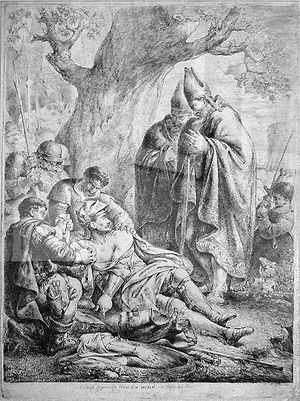Battle on the Elster
| Battle on the Elster | |||||||
|---|---|---|---|---|---|---|---|
| Part of the Great Saxon Revolt | |||||||
 Rudolph, the Anti-Kaiser of Henry IV, Loses His Arm in Combat Engraving by Bernhard Rode, 1781. | |||||||
| |||||||
| Belligerents | |||||||
| Holy Roman Emperor, Henry IV | Rudolf of Swabia | ||||||
| ||||||
Battle on the Elster (German: Schlacht bei Hohenmölsen) was fought between Holy Roman Emperor Henry IV and the German anti-king Rudolf of Swabia on October 14, 1080 near Hohenmölsen on the Weisse Elster.
Prelude
Henry was trying to unite his forces from southern and western Germany with those of Bohemia and Meissen. To do so Henry had to bypass Rudolf's Saxon allies. Henry successfully drew off the Saxons by feignting a move toward Goslar, while his main army crossed Thuringia eastwards along Saxony's southern border. Henry was hoping to meet up with the other half of his forces on the Saale or Elster Rivers.
Rudolf's army soon realized its mistake and pursued Henry. Rudolf caught Henry's army on the western bank of the Elster near Hohenmölsen. While his Bavarian contingent may have joined him, the contingents from Bohemia and Meissen were still on the far bank. Henry retreated to a swampy valley called the Grona.
Battle
The battle began with knights from both armies trading insults. Henry was initially protected from Rudolf's army by the swampy ground. Nearby was the bridge over the Elster to the town of Zeitz. The bridge was being held against Henry, probably by the townsmen. To meet up with his other forces, Henry would either have to force the bridge or build his own crossing.
Meanwhile Rudolf wanted to prevent Henry's escape. The long pursuit had weakened the cavalry. Rudolf ordered the knights with tired horses to dismount and strengthen the infantry. Otto of Nordheim led these forces on a direct assault across the swampy Grona. Meanwhile the remains of Rudolf's knights attempted to circle the swamp. While Henry and Rudolf's knights fought on the periphery of the swamp, Otto was able to force his way through Henry's screening force and broke into Henry's camp. Otto retained control of his force and prevented them from plundering the camp. Otto's force then fell on the remains of Henry's army engaged with the rest of Rudolf's forces.
Henry's army broke. Many of Henry's warriors drowned in the Elster. Henry was able to escape.
Aftermath
Although a military defeat for Henry, Rudolf died from a lost hand and a wound in his belly. With Rudolf no longer a threat, the rebellion had lost its focus.
References
- Christopher Gravett, German Medieval Armies 1000-1300, Men-at-Arms 310, Osprey Publishing, Ltd., 1997, pp 22-23, ISBN 1-85532-657-4